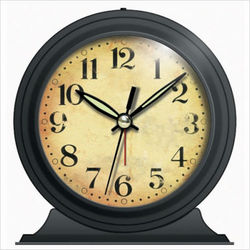 When my wife and I got married, a friend gave us a practical, but highly symbolic gift: a clock. It’s a lovely tabletop model, in a glass case, with gold fixtures and various moving parts.
When my wife and I got married, a friend gave us a practical, but highly symbolic gift: a clock. It’s a lovely tabletop model, in a glass case, with gold fixtures and various moving parts.
The gift was especially meaningful because time is part of what marriage is about – the commitment of a lifetime. Every passing day is a reminder of how fleeting and precious that time together can be. The clock sits on a shelf and bears witness to this: there is nothing as valuable, or irreplaceable, as the gift of time.
I thought about that when I read over this Sunday’s gospel – which is also about the gift of time. In the parable, it’s a gift that the gardener offers the fig tree – an extra year, time to be nurtured, to be cultivated, to produce fruit. It is, by implication, the gift that God is offering all of us – more time to grow, to repent, to bear fruit. And it’s something for us to be mindful of during Lent. This is a moment for us to turn back to the Father, to “rend our hearts,” as the prophet put it on Ash Wednesday. It’s a season to prepare ourselves for our judgment before God, and to realize that we don’t have forever.
One person who has come to understand that is a man named Mark McKinnon. He is a media strategist who has worked for people like George W. Bush, John McCain and Texas governor Ann Richards. Last month, in an online essay, he explained how he came to better appreciate the time we have been given.
McKinnon described himself as being one of the luckiest people he knew – “hit with the lucky stick,” is how he put it. He had a good life, a great career and, best of all, a wonderful wife named Annie. She was more than his friend and companion – she was his high school sweetheart and, in his estimation, absolutely perfect. Beautiful, caring, thoughtful. His love for her is palpable.
A couple years ago, Annie was diagnosed with a particularly aggressive form of cancer – the kind most people don’t survive. But Annie McKinnon was determined not to be one of them. When she was told this cancer only had a 15% survival rate, she stuck out her chin and said to the doctor, “Well, I feel sorry for the other 85%.” She refused to surrender.
She went through every kind of surgery and treatment available. By the grace of God – and the miracle of science – she beat the odds. And as her husband wrote, “Annie was Lance Armstrong in a skirt.” The cancer went into remission. Instead of a statistic, Annie became a survivor.
And Mark McKinnon – like the fig tree — was given the gift of time. More time with Annie. Time to grow old. Time to watch their children have children of their own. And he decided that he wasn’t going to allow himself to forget it.
 So he sat down and looked at his age, his family history, his own medical history. And he figured that, if his luck held out, he could expect to live for another 10,136 days. Then he went out and bought two glass jars — and 10,136 beads. He filled one jar with the beads and left the other one empty, and put them both on his desk. And now every day, he takes one bead from the full jar, and places it in the one that’s almost empty. And that is how he measures his days.
So he sat down and looked at his age, his family history, his own medical history. And he figured that, if his luck held out, he could expect to live for another 10,136 days. Then he went out and bought two glass jars — and 10,136 beads. He filled one jar with the beads and left the other one empty, and put them both on his desk. And now every day, he takes one bead from the full jar, and places it in the one that’s almost empty. And that is how he measures his days.
As McKinnon wrote: “Every day when I take out a bead, I stop for a moment, close my eyes, and say a prayer of thanks. Thanks for my health. Thanks for my friends. For my two incredible daughters. Thanks for a lucky, lucky life. And thanks most of all for Annie.”
It’s a beautiful lesson, I think. Especially now. We began Lent with ashes on our foreheads and a challenge: “Remember you are dust, and unto dust you will return.” Have we remembered? Or have we forgotten it already? Maybe we also need to remember something else: that our days are like so many beads – collected, and then spent.
Maybe we should imagine God greeting us at the end of our days with a jar of beads. “Here,” He will say. “Tell me what you did with your days.”
And we may pick them up and remember. But remember…what? “This is the day I broke someone’s heart. This is the day I betrayed my wife. Here is the day that I lied to stay out of trouble.”
Or will we remember something else? “This is the day I forgave a debt. This is the day I prayed for a stranger. Here is that day in Lent of 2010 that I was finally willing to rend my heart, and return to the gospel. This is the day that I loved like Christ.”
A famous ad for a credit card company asks: what’s in your wallet?
Maybe we should ask: what’s in my jar?
We can all learn something from Mark McKinnon – and from the fig tree. Let us use this Lent to ask ourselves: what are we doing with the time of our lives? How are we spending it? How can we, like the gardener, nurture it, cultivate it, help it to bear good fruit?
None of us knows how long we have – how many days we’re allotted, how many beads will fill our jar.
But we do have today. Here. Now. This Lent, this year.
What are we waiting for?

